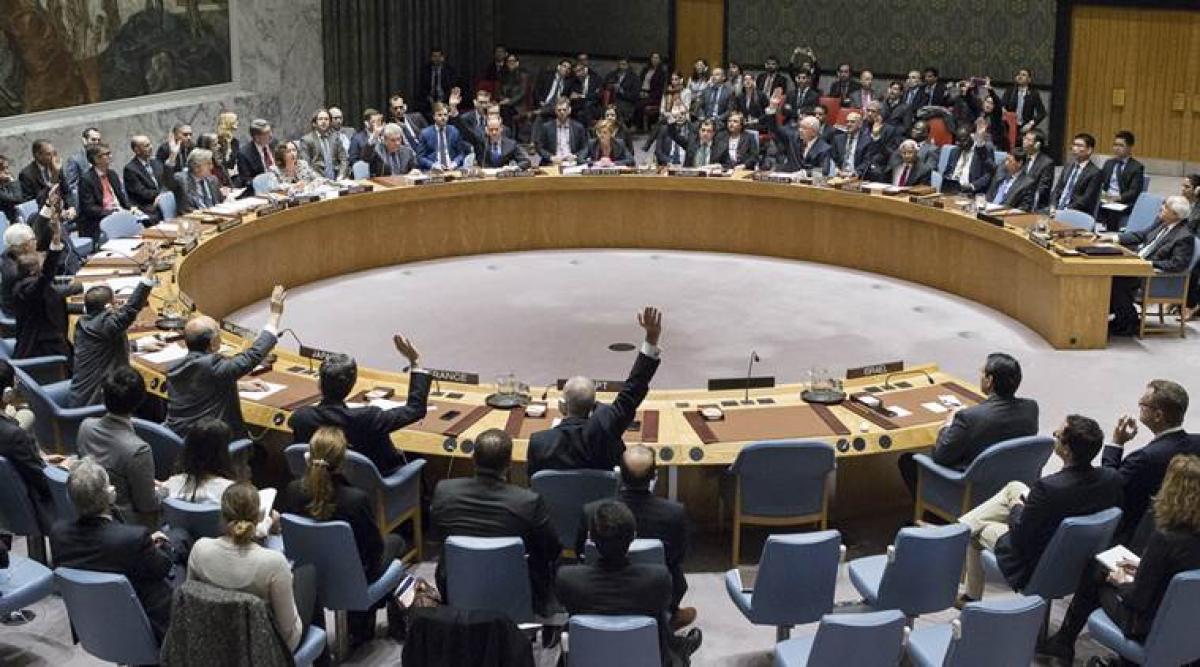Live
- WHO reports declining monkeypox cases in Congo
- CM Attends Kotideepotsavam on Kartika Purnima
- PKL Season 11: Raiding trio of Devank, Ayan, Sandeep help Patna Pirates rout Bengal Warriorz
- Food waste crisis fuels sustainable practices across APAC food & beverage industry: Report
- AI helps erase racist deed restrictions in California
- ATMIS completes third phase of troops' drawdown in Somalia
- PM Kisan Samman Nidhi scheme bringing smile to Nalanda farmers
- German economy forecast to lag eurozone growth until 2026
- CM Shinde orders stern action against hoarding of onions amid rising prices
- Protest rallies in Manipur against 'mass killing of 10 village volunteers'
Just In

The US has defended its decision to refrain from vetoing a UN Security Council resolution condemning Israeli settlement building in Palestine, saying the unusual step was taken only after all negotiating options to pursue a two-state solution were exhausted.
The US has defended its decision to refrain from vetoing a UN Security Council resolution condemning Israeli settlement building in Palestine, saying the unusual step was taken only after all negotiating options to pursue a two-state solution were exhausted.
President-elect Donald Trump meanwhile slammed the outgoing Obama administration for abstaining from voting. "As to the UN, things will be different after Jan 20th," he tweeted.
In a move seen as a diplomatic rebuke to its closest Middle East ally, the United States had decided not to veto the resolution demanding an end to Israeli settlements on Palestinian territory, introduced in the UN Security Council by Egypt. "The United States acted with one primary objective in mind: to preserve the possibility of the two state solution, which every US administration for decades has agreed is the only way to achieve a just and lasting peace between Israelis and Palestinians," said Secretary of State, John Kerry.
"One of our grave concerns is that the continued pace of settlement activity -- which has accelerated significantly since 2011, when we vetoed the UN Security Council resolution that condemns settlements -- puts at risk the two-state solution, as does any continued incitement to violence," Ben Rhodes, Deputy National Security Advisor told reporters during a conference call yesterday afternoon. "In that context, we therefore thought that we could not in good conscience veto a resolution that expressed concerns about the very trends that are eroding the foundation for a two-state solution," Rhodes said in defence of the decision.
Describing this as a rebuke to Israel, The Washington Post said decision not to veto reflected frustration from the Obama administration over the settlements and defied pressure from Trump. A day earlier, Trump, in a tweet, had asked the US to veto the resolution.
Rhodes stressed that the US had exhausted every effort to pursue a two-state solution through negotiations, discussions and confidence-building measures. "We gave every effort that we could to supporting the parties coming to the table. So within the absence of any meaningful peace process, as well as in the face of accelerated settlement activity that put at risk the viability of a two-state solution, that we took the decision that we did today to abstain on this resolution," he said. The Deputy National Security Advisor said the US does have concerns about the UN as a venue for addressing aspects of the Israeli-Palestinian conflict.
"That is why, for instance, we have consistently resisted efforts to impose a solution to the conflict through the United Nations, through the drawing of borders, or the recognition of a Palestinian state," he said.
"Today's passage of an ill-conceived resolution on Israeli settlements marks another shameful chapter in the bizarre anti-Israel history of the United Nations," said Senator John McCain, Chairman of the Senate Armed Services Committee. "The abstention of the United States has made us complicit in this outrageous attack, and marks a troubling departure from our nation's long, bipartisan history of defending our ally Israel in the United Nations. This resolution will serve as yet another roadblock to peace between Israelis and Palestinians, and embolden the enemies of Israel," he said.
House Democratic whip Steny H Hoyer also expressed his deep disappointment over the abstention."Blaming Israel for the continuation of the conflict is not only wrong and unjust; it will also do nothing to move the parties closer to a peaceful and lasting solution. I join in expressing my very significant disagreement with the Administration's decision to abstain," he said.
"Refusing to veto an anti-Israel UN resolution will do absolutely nothing to promote peace in the region and only continue this Administration's policy of undermining our allies," said House Majority Leader Kevin McCarthy.
Meanwhile, US Ambassador to the UN Samantha Power defended the step saying the United States will not support the use of any additional land for the purpose of settlements during the transitional period. "Indeed, the immediate adoption of a settlement freeze by Israel, more than any other action, could create the confidence needed for wider participation in these talks. "Further settlement activity is in no way necessary for the security of Israel and only diminishes the confidence of the Arabs that a final outcome can be freely and fairly negotiated," she said.
The powerful American Israel Public Affairs Committee said it was deeply disturbed by the "failure of the Obama Administration to exercise its veto to prevent a destructive, one-sided, anti-Israel resolution from being enacted" by the United Nations Security Council (UNSC).

© 2024 Hyderabad Media House Limited/The Hans India. All rights reserved. Powered by hocalwire.com







